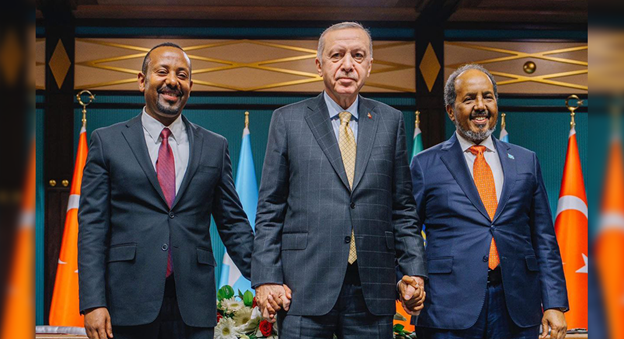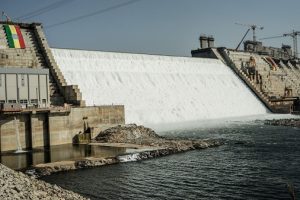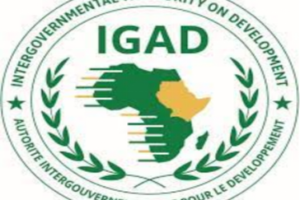
The continent of Africa has to do away with the paradoxical rhetoric it has been displayed for years: endowed with natural resources, human capital, and a range of precious assets but regarded as the poorest and underdeveloped spot of the universe. Such a futile feature can be well altered through bringing about a comprehensive change as a result of establishing concrete fraternity between/among themselves, being committed to working together for the common good, and promoting regional cooperation by fostering socio-economic progress, political integration, and lucrative amalgamation.
Here, Ethiopia and Somalia have been doing well to well reveal what is basically done and needs to be done to meet the desired goals. Not only does their firm tie benefit the two countries, but it could also be an exemplary lesson from which many African countries and beyond can draw. The two sisterly countries, Ethiopia and Somalia, have been renewing fraternity and expressing firm commitment to work together for the tranquility and serenity of the Horn apart from elevating their socio-economic as well as political conglomerates.
Yes, working together via narrowing down gaps, if any, is of paramount importance in growing together in all aspects. The bold move the two countries are exercising right now can be an exemplary amalgamation from which many African countries in general and those of the Horn in particular can draw important lessons, as it is instrumental in booming economic cooperation and the path to shared progress. For instance, the recent official visit of Somalia’s President, Hassan Sheikh Mohamud, to Ethiopia marks a significant milestone in the evolving relations between the two neighboring countries. The visit and the resulting joint communiqué reflect a shared vision of enhanced diplomatic engagement, economic collaboration, and regional stability.
It is also well recognized that inviting nations to work together using a smart approach, viable diplomacy, and an amicable way of running activities is definitely crucial for fostering peaceful international relations, preventing conflicts, and promoting cooperation on regional, continental, and even global issues, serving as a key instrument for managing international relations and achieving common goals. What Ethiopia and Somalia have done in this regard is worth mentioning indeed!
Unequivocally, the recent visit of President Hassan Sheikh Mohamud to Ethiopia symbolizes a new chapter in Ethiopia-Somalia relations, characterized by renewed diplomatic ties, strengthened security cooperation, and a shared vision for economic integration. The joint communiqué highlights a pragmatic approach to tackling shared challenges while laying the groundwork for long-term regional stability and prosperity.
Basically, it is not uncommon for many countries to pledge to work together and run a number of social, economic, and even political activities. However, what matters is translating promises into practical actions for the benefit of peoples on both sides. It seems that Ethiopia and Somalia are carrying out activities taking all this fact into consideration.
Without a shadow of doubt, Ethiopia and Somalia have the potential to transform their relationship into a cornerstone for peace and development in the Horn of Africa by being committed to mutual trust, collaboration, and respect. Of course it has to be well underscored that translating all the commitments the two countries have recently pledged to act upon into actionable outcomes will require sustained political will and sustained engagement. Ethiopia, in this regard, is highly determined to live up to promises and push the bilateral commitments into fruition.
Interestingly, the joint announcement the two countries forwarded of late underscores a mutual commitment to restoring and enhancing bilateral relations through full diplomatic representation. This indicates a reinvigoration of political dialogue following years of fluctuating relations shaped by historical tensions, territorial disputes, and regional complexities.
As a matter of fact, the Horn of Africa has these days required a dedicated, livable, and apt way to emancipate itself from the vicious circle of civil war, conflict, lack of peace, and irrelevant accusation in all forms. Such an upsetting situation has to be done away with, and the Horn and beyond, up to the covering of the entire continent, should breathe a sigh of relief. This kind of sacred deed could never be secured out of the blue; instead, it requires a genuine tie, close fraternity, and meaningful engagements in all aspects, though establishing firm relations needs to be properly handled.
For example, the recent visit Somalia presides paid has been a manifestation of and determined signal of a renewal of trust and confidence aiming to lay the groundwork for sustained cooperation. The emphasis on “full diplomatic representation” in their capitals is a practical step toward enhancing communication and fostering closer relations at the state-to-state level.
Regarding security cooperation and addressing common threats are concerned, both Ethiopia and Somalia face significant security challenges, particularly from extremist militant groups like Al-Shabaab, which operate across borders and destabilize the Horn of Africa.
The commitment to bolster cooperation between security agencies reflects an acknowledgment of the transnational nature of threats. Joint intelligence sharing, coordinated military operations and capacity building could serve as practical measures to mitigate the impact of extremist groups. What is witnessed following the firm relationship between the aforesaid two countries needs to be expanded and well exercised in all the countries of the Horn to make meaningful interventions in terms of political, social and economic trajectories.
No doubt, the emphasis on mutual trust and respect between the two countries as prerequisites for stability aligns with the broader goal of fostering a peaceful regional order. Ethiopia, with its role as a key peacekeeping contributor in Somalia under AMISOM/ATMIS, can weight its military and logistical resources to support Somalia’s security priorities.
The relationship made between the two sisterly counties has been highlighting the importance of expanding economic cooperation, trade, and investment, with infrastructure linkages as a critical enabler. The development scenario is another dimension on which the two countries have planned to act so. Yes, expanding infrastructure linkages, such as road networks and trade corridors, can facilitate greater economic integration and improve access to markets. Ethiopia’s landlocked economy and Somalia’s strategic location with access to the Indian Ocean present an opportunity for mutual benefit.
Furthermore, the focus on robust economic cooperation opens avenues for joint ventures in sectors like agriculture, energy, and transport. Leveraging shared resources, such as Ethiopia’s renewable energy potential and Somalia’s port facilities, could unlock regional growth.
Undeniably, Ethiopia and Somalia have been working together in terms of building a collaborative framework and joint trajectory of attaining common good. That is why the leaders’ discussions on regional stability and their reaffirmation of the Ankara Declaration have been taken as a reflection of their commitment to a broader framework of regional cooperation.
Obviously, regional cooperation and continental growth can be well-nourished and expanded, taking the good lessons the two contraries have farmed into consideration. By being committed to expediting technical negotiations under the Ankara Declaration, the two nations signal their intent to operationalize agreements that prioritize peace, development, and solidarity in the Horn of Africa.
Moreover, improved bilateral relations can reduce the risk of external powers exploiting divisions between Ethiopia and Somalia. A united front could enable the region to negotiate from a position of strength in global forums.
Succinctly, as the functioning of diplomacy is influenced by a complicated combination of different interrelated factors, the two countries have to be in a position to view all sorts of common aspects as inputs for their common prosperity and beyond. Yes, the evolution of diplomacy and how it has been nurtured has to be well embarked on as it is quite instrumental in insuring peace, serenity, and good governance as well as increased bilateral ties that help them adjust themselves to meet the new challenges, to become more relevant, open, and agile, to modify all their approaches, and to optimally utilize opportunities offered by the multifarious bilateral ties. Since transforming Africa involves addressing various challenges and harnessing opportunities for sustainable development, focusing on areas like knowledge production, economic growth, and social inclusion, initiatives like Agenda 2063 matter the most and need to be heartily embarked on.
BY MENGESAHA AMARE
THE ETHIOPIAN HERALD THURSDAY 3 APRIL 2025




